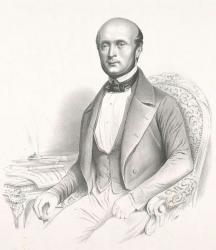Planning worship?
Check out our sister site, ZeteoSearch.org,
for 20+ additional resources related to your search.
- |
User Links
Person Results
John Erskine
1879 - 1951 Composer of "ST. PAUL'S" in The Hymnal John Erskine (October 5, 1879 – June 2, 1951) was an American educator and author, pianist and composer. He was first an English professor at Amherst College from 1903 to 1909, followed by Columbia University from 1909 and 1937, during his tenure he formulated General Honors Course, which later founded the influential Great Books movement. He published over 100 books, novel, criticism, essays including his most important essay, The Moral Obligation to Be Intelligent (1915).
Erskine was born in New York City, New York, the son of Eliza Jane (née Hollingsworth) and James Morrison Erskine, and raised in Weehawken, New Jersey. He graduated from Columbia University, B.A., 1900, M.A. 1901 and Ph. D., 1903 and D. Litt. 1929, besides D. Litt. degree from Amherst in 1923.
Professor Erskine first remained English professor at Amherst College from 1903 to 1909, subsequently taught at Columbia University from 1909 to 1937. In 1920, he instituted Columbia College's General Honors Course, a two-year undergraduate seminar that would later help inspire "Masterworks of Western Literature," now known commonly as "Literature Humanities," the second component of Columbia College's Core Curriculum. This course taught the classics in translation instead of the original Latin or Greek, and concept he elaborated in his noted essay The Moral Obligation to Be Intelligent. He found little support for the course from the senior faculty, and junior faculty members like Mark Van Doren and later after 1923, Mortimer Adler took up sections of the course. This course would later go on to inspire the Great Books movement, centered on the Great Books of the Western World. The course was discontinued in 1928, though later reconstituted. In 1929, Adler left Columbia to join University of Chicago, where continued working on the theme with Robert Hutchins, President of the University. Together they subsequently went on to found the Great Books of the Western World program and the Great Books Foundation.
Erskine co-wrote the 1900 Varsity Show at Columbia, writing musical score for libretto The Governor's Vrouw (1900), a two-act comic opera by Henry Sydnor Harrison and poet Melville Cane, who also wrote the lyrics. He won the Butler Medal in 1919. During his career Erskine published over 100 books, [1] though as a writer he first received acclaimed with his novel, The Private Life of Helen of Troy (1925), which was adapted to silent film, by the same the name in 1927, directed by Alexander Korda. Other films based his works were, A Lady Surrenders (1930) by John M. Stahl, Bachelor of Arts (1934) by Louis King and The President's Mystery (1936) directed by Phil Rosen. The 1956, biopic of French noble women, Diane de Poitiers, titled Diane was based on his story with screenplay by Christopher Isherwood. He was also the author of numerous publications, including several humorous novels retelling myths and legends, besides essays, criticism, and two volumes of autobiography. These included Penelope's Man and Adam and Eve, Though He Knew Better.
Erskine was also accomplished composer, pianist and musician, he wrote several books of music and the libretto for George Antheil's opera Helen Retires (1931), which was based on The Private Life of Helen of Troy. He remained the first president of the Juilliard School of Music from 1928 to 1937. He also remained director of the Metropolitan Opera Association, which runs the Metropolitan Opera, a noted opera company based in New York City.
To commemorate the seven hundredth anniversary of Roger Bacon, Erskine wrote A Pageant of the Thirteenth Century, a biographical play which was produced at Columbia University and published as a book by Columbia University Press in 1914. The Archives and Special Collections at Amherst College holds a collection of his papers. In 1946 he served as the first chairman of the American Writers Association.
He was married twice, Helen Worden Erskine (m. 1946–1951), Pauline Ives (m. 1910–1945). With his wife, Pauline (Ives), he was the grandfather of actress Lindsay Crouse and the great-grandfather of actress Zosia Mamet. He died on June 2, 1951 in New York, New York at the age of 71.
--en.wikipedia.org/wiki/
John Erskine
Caryl Florio
1843 - 1920 Composer of "SMITH" in Gloria Deo Real name William James Robjohn. He used Caryl Florio as a pseudonym.
Caryl Florio
Giuseppe Concone

1801 - 1861 Person Name: Concone Composer of "[Tarry with me, O my Saviour]" in The Hymnal, Revised and Enlarged, as adopted by the General Convention of the Protestant Episcopal Church in the United States of America in the year of our Lord 1892 b. Sept. 12, 1801, Turin, d. June 1, 1861, Turin; composer and singing teacher
LOC Name Authority Files
Giuseppe Concone
Milo W. Nethercutt
Composer of "[Tarry with me, O my Savior!]" in The Evangelists' Songs of Praise No. 2
Milo W. Nethercutt
Samuel A. Baldwin
1862 - 1949 Person Name: Samuel A. Baldwin, 1862-1949 Composer of "BALDWIN" in AGO Founders Hymnal
Samuel A. Baldwin


 My Starred Hymns
My Starred Hymns


